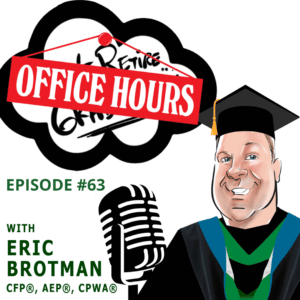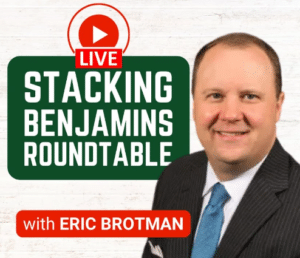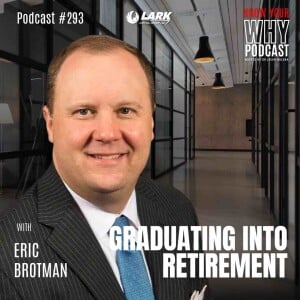In today’s Office Hours, Eric answers Emily’s question: “how does the 2022 market correction compare to prior market corrections and what should investors do?”
The factors causing the current market conditions are unique, but there is a common factor that exists between all the corrections we’ve seen in the past: fear. This episode will explain what is happening in the markets right now and what investors should be doing.
Have a question? Post it in the comments, tweet it to us at @BrotmanPlanning, or post it on our Facebook and it may be used in a future episode of Office Hours!
[00:00:00] Eric Brotman: Welcome to Don’t Retire, Graduate!: the podcast that asks you what you want to be when you grow up so you can graduate into retirement with purpose and passion. I’m your host in valedictorian, Eric Brotman, and this is Office Hours where we answer listeners questions about personal finance, retirement readiness, and more.
We received a question from Emily who asked, “how does the 2022 market correction compare to prior market corrections and what should investors do?” And Emily, isn’t that the big the, the big 500 pound question that we’re all dealing with here? The, the reality is that the correction this year is based on factors that are unique.
And there’s this tendency to believe that anytime the market corrects or there’s a bear market, in fact that it’s different this time. And I’d like to, I’d like to share with you that I think, yes, the facts are different, the reasons are different, but I don’t think our behaviors or reactions should be different.
So the, the prior corrections, the, the most recent ones were in Y two K. So when March, 2000 hit there was a giant market correction and then the great financial crisis in 2008, 2009, when markets dropped, in some cases as much as 40 to 60% depending on the type of asset class and type of market in like six weeks.
So this 2022 correction has been a little more gradual, but it’s also it, it’s also been significant. So what do investors do? Well, it depends a little bit on you, Emily. If you are 25 years old, 35 years old, 45 years old, and you’re adding money to your 401K or other savings vehicles or investment vehicles, and you’re doing this every paycheck or every month and you’ve got it automated, don’t stop doing that.
And the reason I say it is you are getting an opportunity to buy securities, the same securities you wanted to buy in the first place, but you’re able to buy them on sale, you’re able to get a discount on them. You know, I’ve often joked that, that the stock market is the only place where people feel like if there’s a sale, something’s defective, A sale on towels at Macy’s used to have a line around the door on Black Friday, but a sale on Wall Street, people think something’s wrong. The reality is this is now a supply and demand game, and people are going to continue to, to see downward prices as long as there are more sellers than buyers. Once people decide that the bottom is near and, and start start buying again, we will see a correction at some point.
I don’t know when that’s going to be. I don’t know if it’s gonna be next week or in three months or in two years. I’m just a firm believer that at some point, particularly, particularly equities there will be some recovery because there are earnings. And when there are earnings, there’s a reason to buy a security.
So for you, if you’re 25, 35, 45, if you’re adding to an account on a regular basis, keep doing it. If you’re 55 to 65 and you’re contemplating retirement or graduating into retirement, in the near term, you want to treat some of your assets with kid gloves. In other words, you want some assets that are relatively secure, but you’re liable to still be buying.
You’re in your peak earning years. So in the accounts where you’re buying, keep buying. In accounts where you’re holding, meaning you’re not adding to these accounts, be a lot more conservative in those spots because you don’t have the same opportunity to buy low. Now, if you are 65 plus and you’re either fully graduated into retirement, or you are moonlighting, or you are consulting or you are just sort of at the, at the tail end of a of your career, You might be in a spot where you’re gonna start withdrawing from your portfolio at some point.
For people withdrawing from their portfolios, the biggest thing that can go wrong is withdrawing from assets that are at- risk assets at a point in time when they’re deflating, when they’re losing value, we don’t want that to happen. So segregate your assets. Have one account or more than one account that is extraordinarily secure.
Cash equivalents, short term bond, boring, boring, boring, but have five years or so of a runway so that you know where your income’s gonna come from, from those accounts without worrying about what the, the, the stock markets or real estate markets or other markets are doing during that period of time. If you do that, it will allow your other assets to stay invested and to stay in some form of growth security.
And so Emily, you asked a great, a great question. How is this similar? It’s similar because we’re, we’ve got fear now, and when there’s fear, the fear will drive markets down until greed takes over. And fear and greed are like a pendulum for investors. And when that occurs, as soon as greed steps in, you will see a massive buying and you will see the, the market go the other direction.
So I know I haven’t answered your question specifically. I don’t know enough about you to advise you. But as a general rule, if you’re a buyer, keep buying. If you’re a holder, make sure you’re being a little bit more thoughtful about the level of risk you’re taking. And if you’re a seller, Take basically no investment risk on the accounts from which you’re withdrawing, or at least segregate part of that account to make sure you’re, you’re protected.
So I, I hope that helps Emily. Great question. I’m glad you asked it. If you’d like to ask us a question, which we can answer in a future episode of Office Hours, post it on our Facebook page, or tweet us at @BrotmanPlanning. I’d like to thank all of you for listening. We’d love to hear from you, so please send us a message or leave us comments at DontRetireGraduate.com or on social media or leave ratings and reviews on your favorite podcast site. If you enjoy the show, share it with your friends and family so they can join you on your journey to financial freedom. Thanks for coming to Office Hours. We’ll be back next week with an engaging guest.
For now, this is your host, Eric Brotman, reminding you: don’t retire, graduate.
[00:06:01] Narrator: Securities offered through Kestra Investment Services, llc. Kestra is member FINRA, SIPC. Investment advisory services offered through Kestra Advisory Services, llc. Kestra AS, an affiliate of Kestra IS. Kestra IS or Kestra AS are not affiliated with Brotman Financial or any other entity discussed.







